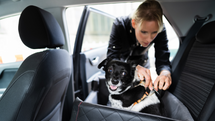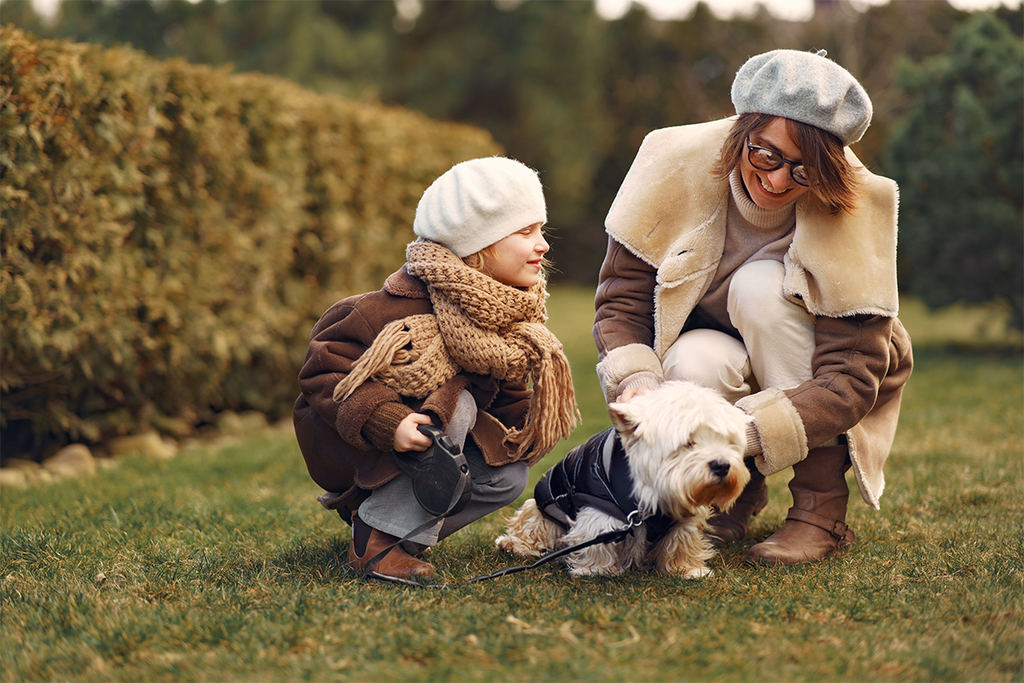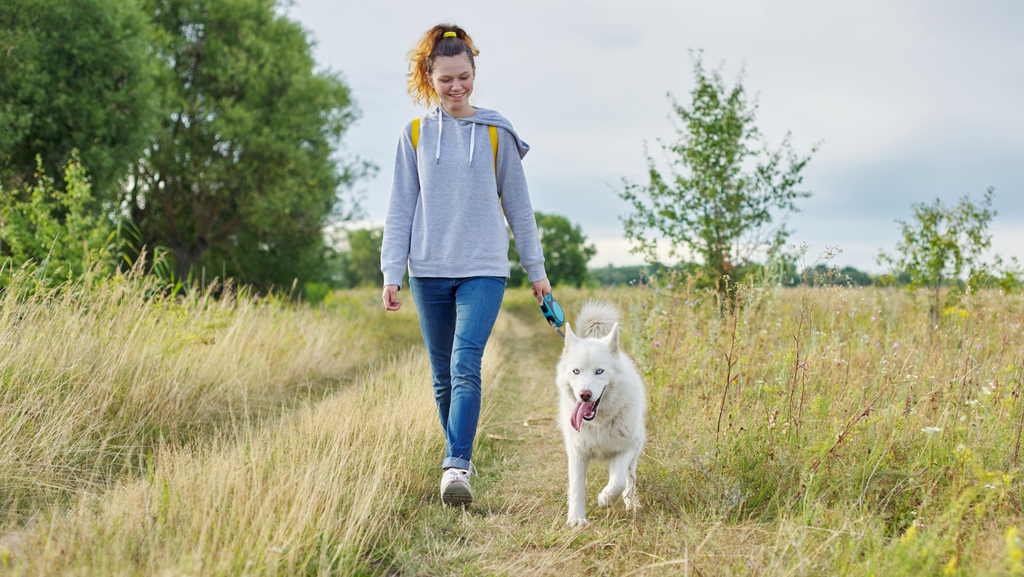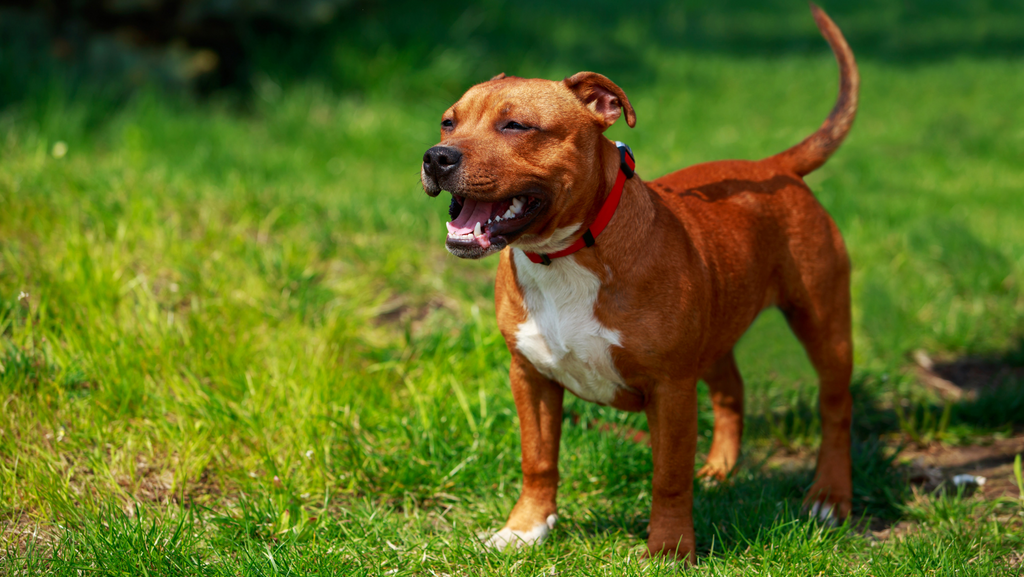Wellbeing for Dogs: A Complete Guide

For us humans, achieving optimal health and wellness requires a holistic approach—and it’s no different for our four-legged friends.
From the quality of your doggo’s food, to their dental health, grooming, physical exercise, play, socialisation and obedience training, there’s a lot that goes into achieving and maintaining optimal wellbeing for dogs.
While it can seem complicated, when you break down each of these key wellbeing essentials for dogs, it’s actually pretty easy to keep your doggo feeling happy and healthy. Here’s the run-down on what you need to know…
Nutritional Wellbeing for Dogs
When you don’t eat well, you don’t feel great—right? Same goes for your pooch.
We’re sure it won’t come as a surprise that adequate and appropriate nutrition is a crucial element of dog health and wellbeing, but when it comes to selecting the best wellbeing dog food for your pooch, there’s a world of choice out there including:
-
Dry dog food/kibble diet: Premium dry dog food has a very low moisture content and typically contains a combination of proteins, cereals, vitamins, minerals, and antioxidants.
-
Raw or BARF diet: An evolutionary diet which consists entirely of raw meals for dogs foods including lean muscle meats, organ meats, bones, vegetables, fruits, eggs, yoghurt, kelp and herbs.
-
Wet/canned dog food diet: Generally contains similar ingredients to dry dog foods, but with a much higher moisture content.
-
Home-cooked diet: Home-made self-prepared meals.
Your doggo’s diet needs to include a good balance of proteins, fats, carbohydrates, vitamins and minerals, as well as plenty of water for hydration to help them stay in tip-top condition.
Whether you choose to feed your dog a mixed diet containing several types of dog food or you decide to stick exclusively to a single feeding option, as long as you select a food which is ‘complete and balanced’, you can rest easy knowing your dog is getting all the essential nutrients it needs in the correct ratios.
If you want to select an optimal dog food, look for foods which are also natural, preservative free and contain a range of premium-quality human grade ingredients (like ours!).
If you’re thinking about preparing your dog’s food yourself, make sure you have a chat to your vet first to get a better gauge of your dog’s individual nutritional requirements, as things like their size/weight, activity level, condition and stage of life can influence what they need.
Most dog owners also like to offer their furry friends healthy organic dog treats as rewards for good behaviour or to show a little extra love. While the occasional dog treat won’t cause any harm to your dog’s health, only give them in moderation as they can be high in calories without providing much nutritional value.
For some more super-helpful tips and info, take a look at our other dog nutrition and feeding guides:
Caring for your dog’s teeth and mouth

Dog health and wellbeing also requires good dental hygiene practices to prevent a range of dental and oral health issues.
Just like us, dogs can experience a range of dental and oral health problems including periodontal disease, abscess, oral infections or fractured or broken teeth. Ouch! Dogs can also have issues eating or chewing because of other oral and dental health issues like retained baby teeth or malocclusion (jaw misalignment).
Regular dental care is an essential element of wellness for dogs, not only because it can prevent a range of issues which could cause pain or discomfort, but it can also support your dog’s immune system and stop a range of other health problems in their tracks.
Things you can do to help keep your doggo’s teeth squeaky clean
-
Brushing their teeth: Brushing your dog’s teeth regularly with a dog-friendly toothbrush and toothpaste will remove plaque before it can develop into tartar, or even nastier, gingivitis and periodontal disease.
-
Dry food diet: Including dry food or kibble in your dog’s diet will help to keep their teeth nice and clean because of the additional chewing required.
-
Dental dog treats: Like dry foods, dental dog treats which take a while to chew will help to scrub their teeth clean as well as stimulating the production of bacteria-fighting saliva.
-
Chew toys: Chew dog toys are a great way to keep your dog occupied and entertained, while secretly also helping keep their teeth clean. Win-win!
-
Dental additives: Dental support products which can be added to your dog’s water, applied as a gel or sprayed onto their food can be helpful.
-
Diet: Certain foods like raw bones, cranberries, strawberries, parsley and fennel are known to be beneficial for dogs’ oral and dental health.
-
Dental check-ups: Ask your vet to check your dog’s teeth and mouth each time you visit. If they spot any issues, they’ll be able to recommend the most suitable treatment option.
We’ve also got loads of other tips about managing your dog’s oral and dental health in our Dog Dental Care Guide.
Keeping your dog fresh and clean
Grooming and hygiene is an important element of dog wellbeing as it helps to keep your dog’s skin and fur clean and free of tangles and matting, while also providing the perfect opportunity to give their general health and wellbeing a quick once-over.
While it will vary from dog-to-dog, a typical grooming routine will generally include:
-
Brushing: Regularly brushing your dog’s fur with a rubber, bristle and/or slicker brush will help to dislodge and remove dirt, debris and scale, while preventing knots and matting and protecting their skin from various irritants.
-
Bathing: Bathing removes a range of impurities and loose hair from your dog’s coat, keeping it shiny, healthy and odour-free. Just make sure you choose a quality dog-friendly shampoo and flea spray.
-
Spot cleaning: Paying careful attention to sensitive areas like the eyes, ears, paws and teeth will ensure your dog is clean and comfortable and can also help to prevent or detect a range of health issues.
-
Nail clipping: Daily walking will usually file down your dog’s nails naturally, but some dogs also need to have their nails clipped manually.
-
Fur clipping or trimming: Some long-haired breeds or breeds with hair growing around the eyes or paws which is causing irritation may also need regular clipping or trimming.
The amount of grooming your dog needs will largely depend on their breed and activity level. It shouldn’t take you too long to work out how much grooming your dog needs.
While plenty of dog owners choose to use a professional dog groomer because they’re either short of time or don’t feel confident grooming their dog themselves, we’ve developed a handy at home dog grooming guide which walks you through it all.
Helping your dog stay fit and active

Getting enough exercise and play time into your dog’s day is another crucial component of wellness for dogs.
Weight management is number one reason to include plenty of exercise and play time in your dog’s routine, as obesity can lead to a long list of nasty health problems including an increased risk of diabetes, respiratory disease and heart disease. Obesity can also put additional stress on your dog’s joints and ligaments and cause complications for dogs suffering from hip dysplasia and arthritis.
Regular exercise also provides some great behavioural benefits—by allowing your dog to burn off excess energy, they’re less likely to become bored or destructive at home. Your shoes and furniture will thank you for it!
Most dogs need around 30 to 60 minutes of exercise per day, but this will largely depend on their breed and life stage. High-energy breeds like Border Collies or Terriers are likely to be on the top end of the exercise scale, while lower-energy breeds like Bulldogs or Cavalier King Charles Spaniels tend not to need as much.
Puppies, adult and senior dogs also have different exercise requirements. While an adult dog may be happy with one decent walk per day, puppies tend to have lots of short bursts of energy, making several short walks throughout the day ideal. Senior dogs can also tire easily and may prefer going on a couple of shorter, slower-paced walks.
Play time is also a great way to incorporate more physical activity into your dog’s day—and it’s fun for us two-legged creatures too! Simple games like playing fetch or throwing a Frisbee, a gentle tug of war game, an agility course, a game of hide and seek or some water will also help to fight boredom, provide mental stimulation and strengthen the bond you share with your doggo.
Socialisation and obedience training

Just in the same way we need to learn the difference between right and wrong and what behaviour is acceptable and unacceptable, so do our pups.
Socialisation and obedience training are also key wellbeing essentials for dogs that are most effective when introduced at a young age. Early socialisation is critical to your dog’s learning and development, as the experiences your puppy has between 3 and 17 weeks of age can influence the behaviours they display as they mature.
Socialisation helps your dog become comfortable in the presence of others and teaches them how to play and interact in a friendly manner. Many dogs that haven’t been properly socialised from a young age will display signs of stress, anxiety or aggression around other dogs, animals or people, highlighting the importance of socialising your pup early in the piece.
Once your dog has been vaccinated, enrolling in puppy school is a great way to socialise your dog in a fun, non-threatening and controlled environment. Here, you can also introduce your dog to obedience training which is also key for dog wellbeing—a dog that has been trained to follow its owners’ commands will be safer around children, people and pets, and will be significantly easier to manage when in public compared to an untrained dog. Dog-friendly café here we come!
Studies have also shown that owners of dogs which have received obedience training have a closer bond with their dog and enjoy more satisfaction from the relationship, so it’s a no brainer really!
At Petzyo, we’re all about fostering optimal wellbeing for dogs. That’s why our range of 100% natural premium quality dry and raw dog foods are carefully formulated to provide a complete and balanced diet, without any added nasties.
Find out more about what makes our products great.






